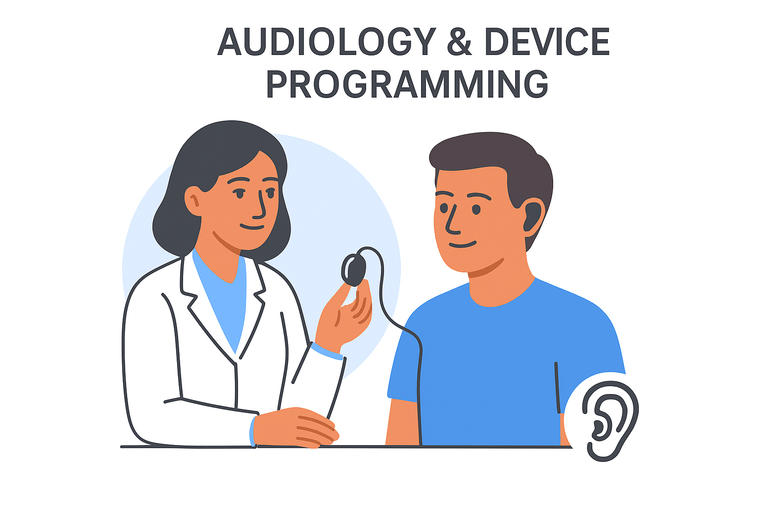After cochlear implant surgery, one of the most important steps in restoring hearing is the audiology and device programming service, commonly referred to as “mapping.” This process involves programming the external sound processor so that it can effectively communicate with the internal implant. Each patient’s auditory nerve responds differently to electrical stimulation, and mapping ensures that sound signals are adjusted to suit their unique needs. Our team of expert audiologists carefully sets the thresholds and comfort levels of the implant to provide clear and comfortable sound perception. This precision-driven approach ensures that patients not only hear sounds but also gradually develop the ability to understand speech and enjoy everyday auditory experiences.

The first mapping session typically takes place a few weeks after surgery, once the surgical site has healed. During this session, our audiologists work closely with patients to measure how the implant responds and fine-tune the sound processor accordingly. Since patients may initially find sounds unfamiliar or overwhelming, mapping is a gradual process requiring multiple follow-up appointments. Our specialists use advanced software and diagnostic tools to monitor the patient’s hearing response in real-time, making adjustments that optimize clarity, loudness, and speech recognition. By customizing these settings, we create a hearing environment that is as natural and comfortable as possible.
Mapping is not a one-time procedure but an ongoing process as the brain adapts to the new way of hearing. In the initial months, frequent adjustments are often required, and over time, follow-up mappings may occur annually or as needed. This continuous care allows patients to benefit from the latest upgrades in technology and ensures their implants remain effective as their listening needs evolve. Our audiology team also conducts speech perception tests, sound-field audiometry, and real-life listening trials to ensure that device programming translates into meaningful improvements in communication and quality of life.
Equally important, our audiologists provide counseling and training to help patients and families understand the new listening experience. For children, parents are guided on how to create a language-rich environment that supports auditory learning, while adults are encouraged to engage in active listening exercises. This combination of technical expertise and personalized support makes our centre’s audiology and mapping services truly comprehensive. By offering continuous adjustments, cutting-edge technology, and patient-centered care, we ensure that every cochlear implant recipient achieves the best possible hearing outcomes and can confidently embrace the world of sound.